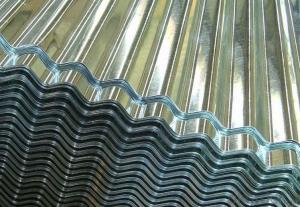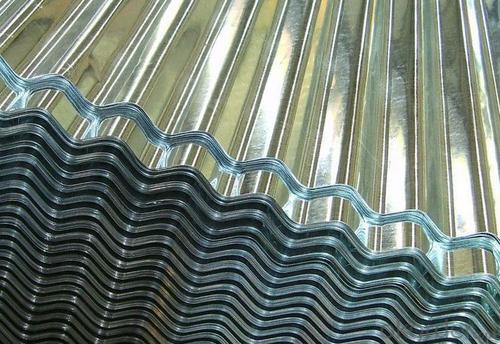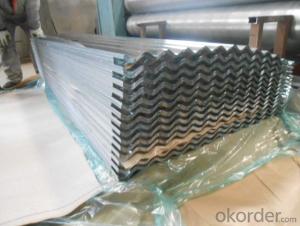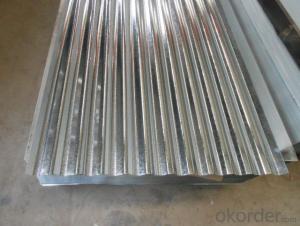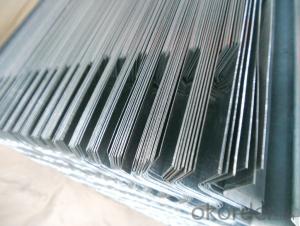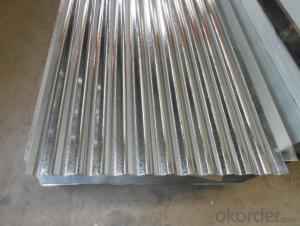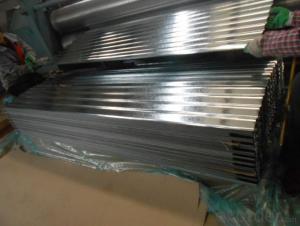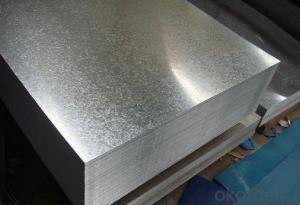Hot Dip Galvanized Corrugated Sheet for Roofing
- Loading Port:
- Tianjin
- Payment Terms:
- TT OR LC
- Min Order Qty:
- 25 m.t.
- Supply Capability:
- 50000 m.t./month
OKorder Service Pledge
OKorder Financial Service
You Might Also Like
Product Description:
Specifications of corrogate sheets :
1) Capacity: about 15,000 tons per month for sheet product.
2) Standard: JIS G3302 1998, ASTM A653M/A924M 2004, all according to the customer's request
3) Thickness: 0.13mm-0.5mm
4) Width: 400mm-1000mm
5) Length: We can adjust the length according to your request
6) Zinc Coating Weight: 60g/m2-275g/m2
7) Raw Materials: Galvanized steel sheet and Pre-painted galvanized steel sheet
8) Spangle: Regular spangle, minimized spangle and zero spangle
9) Hardness: Full hard, normal
10) Color: RAL, or other series
11) Surface Protection: PE, PVC, PVDF, SMP, HDP, etc.
12) Min trial order 10 tons each thickness, 1x20' per delivery
Specification of corrogate sheets :
1) Chemical Composition: 55% Aluminum, 43.4% Zinc, 1.6% Silicon
2) Substrate: Galvalume steel sheet & Pre-painted galvalume steel sheet
3) Standard: JIS3321/ASTM A792M.
4) Thickness: 0.16mm-2.0mm, all available
5) Width: 600mm-1250mm, all available
6) Aluminum Coating: AZ50/AZ100/AZ150/AZ185
7) Spangle: regular spangle, minimized spangle, zero spangle
8) Surface treatment: Chemical treatment, oil, dry, anti-finger print
9) Color series: RMP/SMP/HDP/PVF2
10) Min trial order: 10 ton each thickness, 1x20' per delivery
Our Production Facility of corrogate sheets :
After we get the Galvanized sheet, Galvalume sheet, or Pre-painted Sheet, our Roof Panel Forming Machine can manufacture them as Corrugated Galvalume Roofing Sheet.
- Q: What are the common applications of galvannealed steel sheets?
- Galvannealed steel sheets are commonly used in various industries for applications such as automotive body panels, appliances, HVAC systems, electrical enclosures, and construction components. The galvannealed coating provides enhanced corrosion resistance and improved paint adhesion, making it ideal for these applications where durability and aesthetic appeal are important.
- Q: What are the different sheet metal rolling techniques for steel sheets?
- There are several sheet metal rolling techniques that are commonly used for steel sheets. These techniques include hot rolling, cold rolling, and roll forming. Hot rolling is a process in which steel sheets are heated above their recrystallization temperature and then passed through a series of rollers to reduce their thickness. This technique is commonly used to produce steel sheets with a consistent and uniform thickness. The hot rolling process also improves the mechanical properties of the steel, making it stronger and more ductile. Cold rolling, on the other hand, is a technique in which steel sheets are passed through rollers at room temperature. This process is used to produce thinner and smoother steel sheets with a higher degree of dimensional accuracy. Cold-rolled steel sheets are often used in applications that require a high-quality surface finish, such as automotive body panels and appliances. Roll forming is a continuous bending process in which a long strip of steel is passed through a series of rollers to gradually shape it into a desired profile. This technique is commonly used to produce steel sheets with complex shapes and profiles, such as corrugated roofing sheets or C-channel beams. Roll forming offers excellent precision and repeatability, making it a popular choice for producing large quantities of steel sheets with consistent dimensions. Overall, the choice of sheet metal rolling technique depends on the specific requirements of the application. Hot rolling is ideal for producing steel sheets with a uniform thickness and improved mechanical properties. Cold rolling is preferred for applications that require a high-quality surface finish and dimensional accuracy. Roll forming is suitable for creating steel sheets with complex shapes and profiles.
- Q: What is the fatigue strength of steel sheets?
- The fatigue strength of steel sheets refers to the maximum stress that steel sheets can withstand for a specific number of cycles before failure occurs due to repeated loading and unloading. It is an important factor to consider in engineering applications where materials are subjected to cyclic loads, as it helps determine the durability and reliability of steel sheets under these conditions.
- Q: What is the process of hot-dipping steel sheets?
- The process of hot-dipping steel sheets involves immersing them in a bath of molten zinc to create a protective coating. The steel sheets are carefully cleaned and pre-treated before being dipped into the zinc bath. The high temperature of the bath causes the zinc to bond with the steel, forming a corrosion-resistant layer. This process helps to enhance the durability and lifespan of the steel sheets, making them suitable for various applications in construction, automotive, and manufacturing industries.
- Q: Can steel sheets be used for elevator shafts?
- Yes, steel sheets can be used for elevator shafts. Steel is a widely used material for constructing elevator shafts due to its durability, strength, and fire-resistant properties. Steel sheets are commonly used to create the walls and floors of elevator shafts, providing structural support and ensuring the safety of the elevator system. They can be easily fabricated, allowing for precise customization to fit the specific dimensions and design requirements of the elevator shaft. Additionally, steel sheets can be treated with various coatings to prevent corrosion and enhance their longevity. Therefore, steel sheets are a suitable choice for constructing elevator shafts, offering a reliable and robust solution for vertical transportation systems.
- Q: Are steel sheets vulnerable to UV radiation?
- UV radiation generally does not pose a threat to steel sheets. This is because steel is a highly durable and resilient material that can withstand various environmental factors, including UV radiation. Unlike other materials, steel does not weaken or degrade when exposed to prolonged sunlight or UV rays. In fact, many steel structures, such as buildings, bridges, and outdoor equipment, are specifically designed to endure outdoor conditions and can remain undamaged by UV radiation for many decades. However, it is worth noting that certain types of steel, such as galvanized steel, may offer even greater resistance to UV radiation due to additional protective coatings applied during the manufacturing process. All in all, steel sheets are a dependable option for applications that require protection against UV radiation.
- Q: What's the difference between hot-rolled seamless steel tube and cold-rolled seamless steel tube?
- The difference between hot rolled seamless steel tube and cold rolled seamless steel tube:1) cold-rolled seamless tubes tend to be of small diameter, and hot-rolled seamless tubes are often of large diameter.2) the accuracy of cold-rolled seamless steel tube is higher than that of hot-rolled seamless steel tube, and the price is higher than that of hot-rolled seamless steel tube.3) hot-rolled seamless tubes are divided into ordinary steel tubes, low and medium pressure boiler tubes, high pressure boiler tubes, alloy steel tubes, stainless steel pipes, petroleum cracking pipes, geological steel pipes and other steel pipes, etc..
- Q: Are the steel sheets suitable for outdoor applications?
- Yes, steel sheets are suitable for outdoor applications due to their durability, resistance to harsh weather conditions, and ability to withstand corrosion.
- Q: Can steel sheets be used for elevator or escalator components?
- Yes, steel sheets can be used for elevator or escalator components.
- Q: Where can steel sheets be purchased?
- There are numerous places where one can acquire steel sheets. Local hardware stores, home improvement centers, and metal supply companies are among the common choices. These places typically provide a variety of steel sheet sizes and thicknesses for customers to choose from. Furthermore, the convenience of buying steel sheets online should not be overlooked. Online retailers and e-commerce platforms offer a wider range of options and competitive prices. To ensure you get the most value for your money, it is crucial to compare prices, quality, and customer reviews before making a purchase.
Send your message to us
Hot Dip Galvanized Corrugated Sheet for Roofing
- Loading Port:
- Tianjin
- Payment Terms:
- TT OR LC
- Min Order Qty:
- 25 m.t.
- Supply Capability:
- 50000 m.t./month
OKorder Service Pledge
OKorder Financial Service
Similar products
Hot products
Hot Searches
Related keywords
